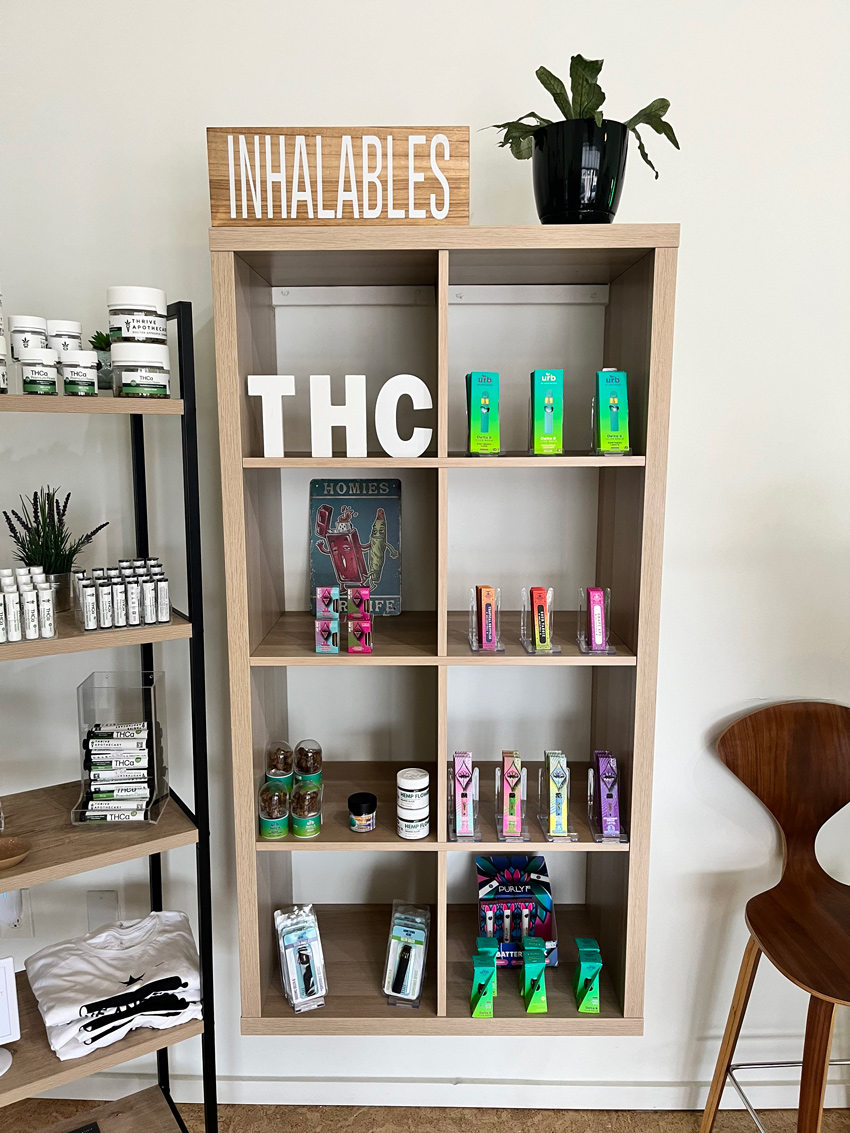For years, Texans have been able to get vaping devices preloaded with THC and other hemp-derived cannabis products from their neighborhood smoke shop. No more. That ended Sep. 1 when a new state law banning THC vapes took effect. The same law banned sales of any vape devices made in China or marketed to minors, as well as other smoke shop items. Days later, Gov. Greg Abbott signed an executive order halting THC product sales to minors.
The legal and regulatory tumult has hemp and vape sellers trimming their product offerings and consumers wondering what they can buy.
“Every day it feels like the game changes,” said Austin Zamhariri, store manager of Thrive Apothecary on South Main Street and executive director of the Texas Cannabis Collective, a nonprofit advocating for the state’s retailers and consumers.
Cannabis businesses welcome the ban on selling to minors. The vape device sale restrictions are a bigger deal. Vapes make up a substantial 24% of the typical cannabis retailer’s sales, according to a Whitney Economics analysis. Now they can’t sell China-made vape devices or any disposables containing THC. Kava, kratom, and mushroom vapes were also outlawed.
The bans apply only to sellers. Consumers can still legally possess THC-loaded vapes, but Texas sellers risk fines up to $4,000 and a year in jail for violations.
Texas cannabis users can likely order from other jurisdictions, but they may not be buying from a high-quality seller, said Cynthia Cabrera, chief strategy officer of Hometown Hero, an Austin maker of hemp products.
She added, “While consumers may attempt to order out of state, sellers and shippers can face legal risk if the product violates Texas statutes or the buyer is a minor.”
Texas escaped a total THC ban when the governor vetoed legislation that would have outlawed any THC product sales. THC consumers can still find and legally purchase edibles, flower, pouches, and tinctures.
“Their legality depends on the product’s cannabinoid content and how Texas defines and limits hemp-derived THC,” Cabrera said. “Some non-vape formats remain legal if they meet hemp and THC thresholds and labeling and testing rules.”
For example, non-heated THC inhalers appear to be exempt from the new legal ban. These deliver THC in aerosol form without burning or vaporizing and are legal for sale as long as they fit the other regulatory limits.
Heather Fazio, director of advocacy at Austin-based lobbyist Texas Cannabis Policy Center, said there could be another loophole. “I’m not an attorney, but my read of the bill is that you can’t sell preloaded vape devices. However, you can sell the vape device and the drops that go into it, and the person can load it themselves like they do with nicotine vapes.”

That doesn’t mean your local shop will recognize these possible workarounds. Thrive’s Zamhariri, for one, advises retailers that trying to skirt the letter of the law could bring down regulators’ wrath. “I would define any kind of vaporization product that involves distillate as a gray area. Be very careful with it.”
An illegal market for banned products seems one likely development. It could emerge online or through retailers operating in the black market. Industry spokespeople unanimously warn against buying from shady shops, warning about risks from impurities and labeling, among other concerns.
And although the recent state law changes penalize only resellers for violations, Zamhariri said consumers can’t be sure how local law enforcement will react if they get caught holding.
“Each jurisdiction — and there are 254 counties in Texas — has their own way of handling and assessing penalties and prosecuting marijuana cases,” Zamhariri said.
In Tarrant County, Zamhariri said, District Attorney Phil Sorrells takes a more relaxed approach than the previous D.A., Sharon Wilson. However, he’s heard of people in other jurisdictions facing Class B misdemeanor charges for possession.
Cannabis businesses generally welcome the ban on THC sales to minors. However, like most of the new restrictions, exactly how it will be enforced remains unclear. The Texas Alcoholic Beverage Commission (TABC) is expected to release guidance on matters including how resellers must verify a customer’s age as 21 or older as soon as Sep. 24. The rest could take months.
Among other things, the Texas A&M University AgriLife Extension program is supposed to conduct a study to inform rulemaking by TABC and the state Department of Health and Human Services on the minor sale ban. Zamhariri is optimistic the study will be more good news, but it may not be out until next year.
And there are plausible scenarios that could go badly for the industry and for THC consumers. Fazio said one concern is a change in the way THC content is assessed. It’s conceivable that THC-A, a compound that when burned becomes the psychoactive THC-9, may be included when measuring whether a hemp-derived product has the permissible 0.3% THC-9 by dry weight. If that happens, Fazio said, “that’s going to mean most of the flower on the market won’t be legal anymore.”
Other future worries include a possible increase in the retail shop license fee from $150 to $30,000. That came up in the last legislative session and, if enacted, would likely greatly reduce the number of retailers.
“We think there’s room to move up” on fees, Fazio said, “but not that much.”
If all this change seems confusing and exhausting, it might have been worse. The governor could have signed rather than vetoed the total THC ban that passed the Legislature earlier in the year.
And it may get worse, although cannabis businesses and users remain hopeful the news for the next few months will be acceptable, if not ideal.
“If all goes well,” Zamhariri said, “we’ll get 21 and up, we’ll get some focus on licensees and who’s the good and bad characters in the space, and they’ll compile a study in the interim that will help the Legislature decide how they want to proceed.”











